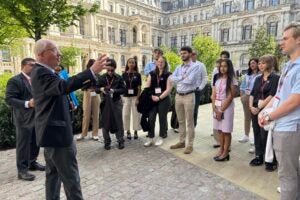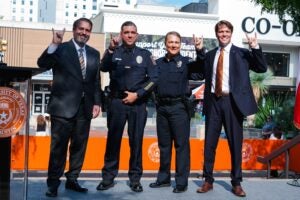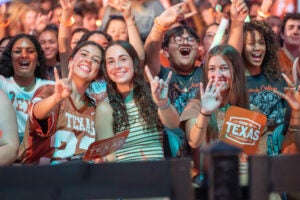AUSTIN, Texas—A new award recognizing the contributions of veteran civil rights leaders will be presented during a public ceremony at 6 p.m. on Thursday, March 25 in the LBJ Library Auditorium at The University of Texas at Austin.
This year’s recipients are Congressman John Lewis of Georgia, National Council of La Raza President Raul Yzaguirre, Nashville sit-in organizer Diane Nash and Central Texas civic leaders Volma Overton and Ada Anderson.
The LBJ Award for Leadership in Civil Rights was created by the Lyndon B. Johnson School of Public Affairs and LBJ Library and Museum to recognize men and women who have helped to enhance the rights of all Americans.
“These men and women were selected because they exhibited moral clarity and physical courage at a time of uncertainty and danger,” said LBJ School Dean Edwin Dorn, who is hosting the event with LBJ Library Director Betty Sue Flowers. The award ceremony is part of a three-day symposium titled “Civil Rights: Black and White to Color.” Commemorating the 40th anniversary of the passage of the 1964 Civil Rights Act, the symposium will honor the courage of those who led the civil rights movement, assess the changes that have occurred since 1964, and examine emerging social justice issues in the 21st century.
Following the ceremony, award recipients will respond to questions from the audience. Lynda Johnson Robb, daughter of President Lyndon B. Johnson who signed the 1964 Act, will preside over the event, which includes performances by the Ebenezer Baptist Church choir and mezzo-soprano Barbara Smith Conrad.
The Thursday evening ceremony is free and open to the public and does not require registration. More information is available at the Civil Rights: From Black and White to Color Conference Web site.
2004 Award Recipients:
- Described as “one of the most courageous persons the Civil Rights Movement ever produced,” John Lewis has dedicated his life to protecting human rights, securing personal dignity and building what he calls “The Beloved Community.” During the height of the Civil Rights Movement, from 1963 to 1966, Lewis was the chairman of the Student Nonviolent Coordinating Committee (SNCC), which he cofounded. In 1964, Lewis coordinated SNCC efforts to organize voters’ registration drives and community action programs during the “Mississippi Freedom Summer.” The following year, he led one of the movement’s most dramatic nonviolent protests. Along with fellow activist Hosea Williams, Lewis led more than 600 marchers across the Edmund Pettus Bridge in Selma, Ala., on March 7, 1965. Alabama state troopers attacked the marchers in a confrontation that became known as “Bloody Sunday.” That march and a subsequent march between Selma and Montgomery, Ala., are credited with leading to the passage of the Voting Rights Act of 1965. In 1977 Lewis was appointed by President Jimmy Carter to direct more than 250,000 volunteers of ACTION, the federal volunteer agency. His first electoral success came in 1981 when he was elected to the Atlanta City Council. In November 1986 he was elected to Congress, and he is serving his ninth term.
- A lifelong community activist, Raul Yzaguirre was born in the Rio Grande Valley of South Texas. In 1964 Yzaguirre founded NOMAS, the National Organization for Mexican Services, and in 1969 he founded Interstate Research Associates, the first Mexican American research association, which he built into a multimillion-dollar nonprofit consulting firm. He serves as president of the National Council of La Raza, the largest constituency-based national Hispanic organization and leading Hispanic think-tank in Washington, D.C. He is also president of the Mexican and American Solidarity Foundation and a member of the Council on Foreign Relations.
- As a student at Fisk University in Nashville, Tenn., in the late 1950s, Diane Nash cofounded the Student Nonviolent Coordinating Committee (SNCC) and led the student sit-in movement that desegregated Nashville’s lunch counters. In 1961, as head of the direct action wing of SNCC, she coordinated the Freedom Ride from Birmingham, Ala., to Jackson, Miss. In 1963 President John F. Kennedy appointed Nash to the national committee promoting passage of the Civil Rights Act. In 1965 she was presented with the SCLC’s Rosa Parks Award for Leadership by Dr. Martin Luther King Jr., for planning and carrying out the voting rights campaign in Selma, Ala.
- Volma Overton, a native of Maha, Texas, became president of the Austin branch of the NAACP in 1962, working the night shift at the Post Office in order to devote his days to the NAACP. Under his leadership the Austin branch picketed segregated businesses, integrated Bastrop State Park, organized a credit union to serve East Austin, led a campaign to institute single-member districts for Austin City Council elections and in 1964 conducted a read-in at an Austin City Council meeting to protest the Council’s refusal to consider an ordinance forbidding racial discrimination and creating a Human Rights Commission. In 1971, Overton was involved in a lawsuit, on behalf of his daughter Dedra Estelle, to force the desegregation of the Austin public schools. He is a deacon at First Baptist Church.
- Ada Anderson was one of the first black students to attend the University of Texas. While working as a real estate broker and investor, native Austinite Anderson has devoted her life to promoting educational opportunities for children, racial equality and the arts. The first African American to win a countywide election in Travis County, Anderson served on the Austin Community College Board from 1982 to 1984. Through her activities on the board of the Austin Lyric Opera, Anderson founded the Leadership Enrichment Program, which has exposed hundreds of minority children to Austin’s cultural resources.
For more information contact: Megan Scarborough, LBJ School of Public Affairs, 512-471-8954.



